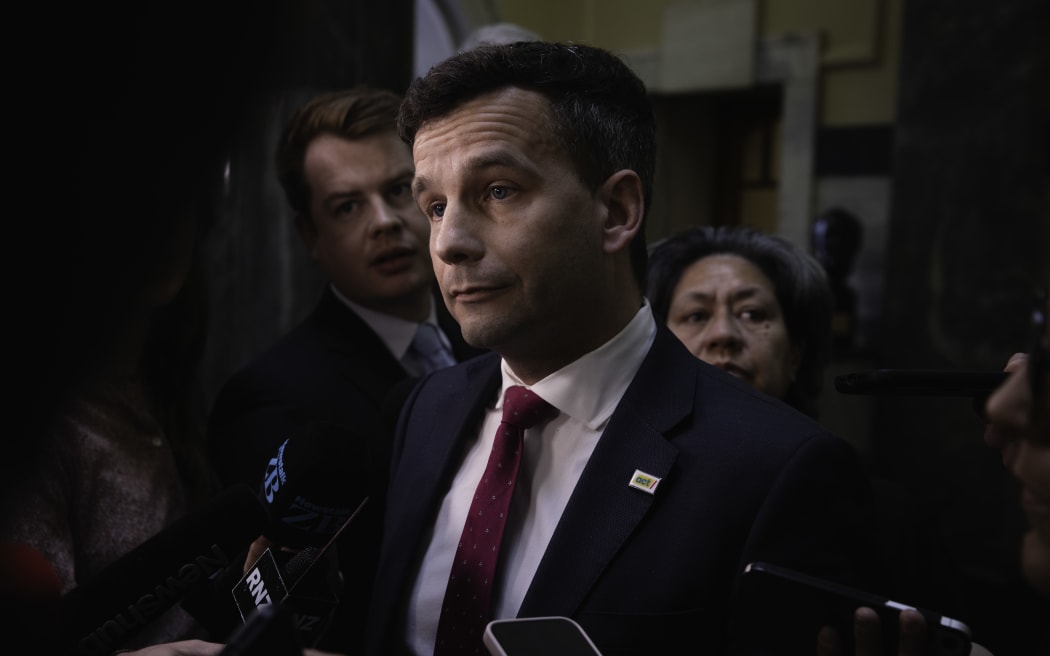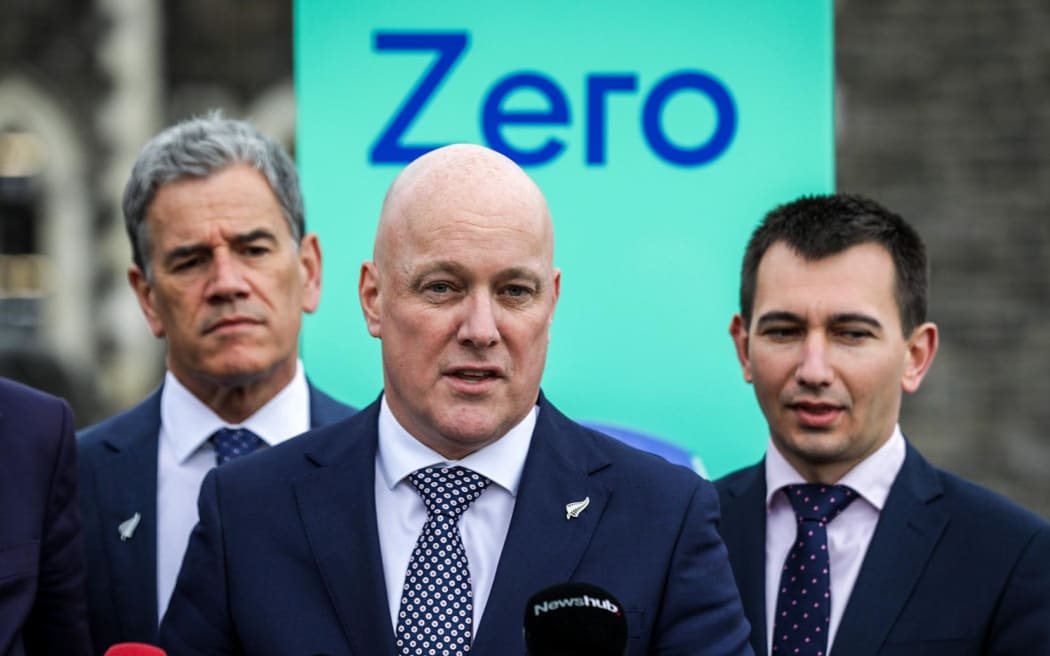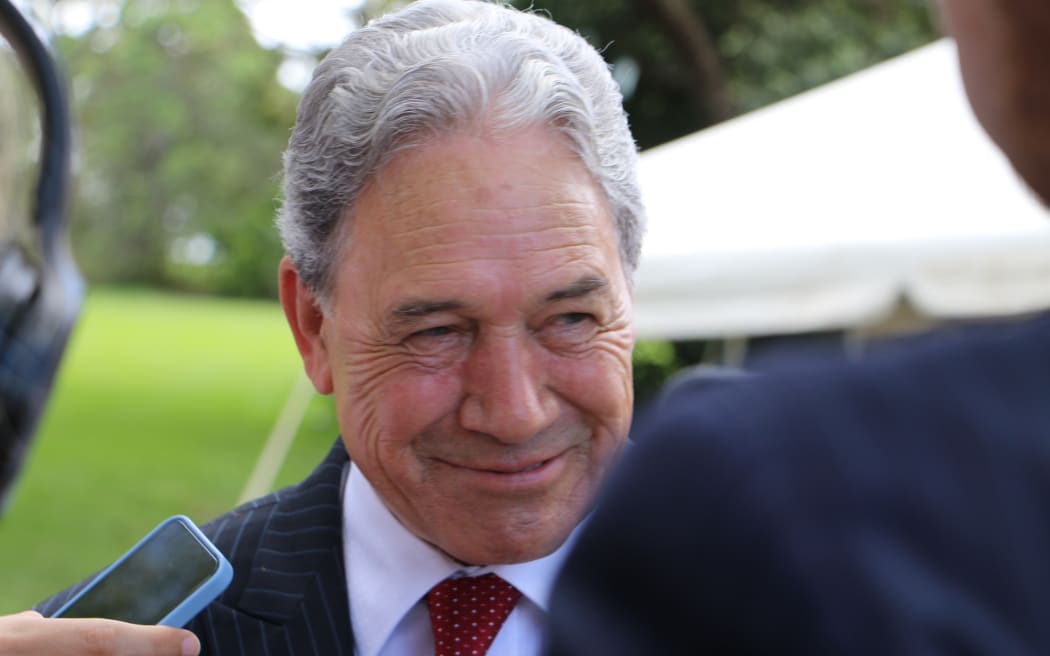
Party leader David Seymour has threatened to resort to a confidence-only deal, which would require the larger party to seek Act's backing for all government spending - or "supply" - decisions on a case-by-case basis.
Recent polls suggest National and Act could form a government together, but National having to also rely on NZ First - who Act has ruled out - is also a real possibility.
National has also begun ruling out - or in some cases merely rejecting - Act policies.
Seymour says if National is not prepared to "fully share power", his party would consider a minority-government position.
"We're prepared to do it if the alternative is taking the baubles of office and letting our voters in New Zealand down. So yep, I've done it before - I turned down being a minister to do End of Life Choice," he says.
However, his version would be a different flavour to what NZ First's Winston Peters has threatened in the past:
"I think we'd be able to be clear that, you know, while they have the confidence of the house, if they want to pass Budgets they are going to have to rely on another party," Seymour said.
"I think it would probably be just confidence."
This would mean that although Act would help National form a government, they could refuse to support its spending initiatives - a break from the traditional "confidence and supply" agreement which sees the minor party guarantee to support the larger's Budget.

A clashes of policy, and personalities
Seymour has had an increasing number of reasons to take this approach.
Although polls have been assuming the two parties would have no trouble forming a government together, Act's share of the party vote has been steadily rising. It means a higher proportion of MPs in Parliament, and the expectation of more influence in Cabinet.
Despite that, National's Christopher Luxon has been rejecting more and more of Act's core policies. Last month he completely ruled out abolishing the Zero Carbon Act, and said he did not support Act's proposed Treaty of Waitangi Principles legislation - stopping short of the hardline rule-out.
This week, Luxon flatly rejected support for several more Act policies, including partial sales of state-owned enterprises, abolishing fees-free first-year tertiary, ending first-home grants, scrapping all film subsidies, ending various research and development grants, and more. His answer to each was either "no" they would not do that - or it was "not our policy".
Seymour says their spending priorities were one of the bigger differences between the two.
"We'd still be negotiating even on Budgets because that's where there's a pretty big difference," he says. "The National Party criticises Labour for increasing spending by $1b a week, and they're absolutely right to criticise Labour on that - we do too - the difference is that [National] are proposing to keep 98 percent of that spending going.
"I think New Zealand needs a more authentic change of direction than that."
Policy differences have not stopped parties teaming up in the past under coalition or confidence-and-supply agreements. NZ First leader Winston Peters has often threatened to "sit on the cross benches" - though what that would mean in practice has never been tested.
Such an arrangement would likely be a much less stable form of government than deals of the past, and potentially unpopular with voters.
Peters explained some of his strategy at a community meeting in Glenfield last week.

Seymour has ruled out working with NZ First at the Cabinet table, leaving open the possibility of an out-of-Cabinet arrangement for one of the parties (no prizes for guessing which).
"Ultimately we do what is in the best interests of our voters," Seymour told RNZ, "I suspect that will mean it's impossible to work with New Zealand First if they did get back into Parliament and I don't say that out of any personal spite, I just look at political history.
"[Peters has] a 40-year track record of falling out with people, letting people down, getting voted out of three electorates, getting voted completely out of Parliament - three times I think - but unfortunately that's the guy's history. He's had many, many chances - and I don't think he deserves another one."
Risking government collapse every year?
Seymour said his idea would be "novel constitutional territory", but seemed confident it could work.
"I think the Governor-General is able enough to see that's where New Zealand's going, we don't have a single-party system of government anymore. In fact, the last three years when we've got that almost by accident has not been a pleasant experience."
University of Otago law professor Andrew Geddis said he suspected Act's gambit was "more of a negotiating ploy" than a solid position, but "if it's been mooted, and it's been said by one of the parties that this is something they're prepared to do, then I guess we have to take that seriously".
However, it would make the next Budget in mid-2024 something of a crunch point - and indeed, every annual budget for the three-year term - and Prof Geddis believed the remaining disagreements over spending would need to be sorted out well before then.
"If they can't get to an arrangement of what that looks like and they can't get a majority to vote for a Budget, at that point the government would fall apart," he said.
"The Budget process starts very early. You have to put in bids, you have to work out how much money is going to go into each area, you have to work out how much money you've got through taxation, and so on.
"I'd imagine in practice, the parties would come to an arrangement as to what their term's going to look like over the three years very quickly - they'd have to. If they tried to do it year on year, just sort of limping along, they wouldn't be able to make any long-term plans, they wouldn't be able to do any big picture developments."

Trade-offs and the rule-out game
Prof Geddis says it's entirely reasonable to ask parties what they would rule out under a potential partnership deal.
"Voting should be about knowing with some degree of certainty ... that if you vote for one party you're likely to get these sorts of policy outcomes," he says.
"Otherwise, you're sort of casting a vote in a veil, it's like a lucky dip: you stick your hand in, you pull out something, you hope it's going to be what you want - but it may not be."
Strategically, however, it makes sense for politicians to try to keep their political opponents guessing in negotiations.
Here's what Winston Peters said when asked about his own negotiation strategy: "Have you ever been in a card game and you showed your other side the cards like that? Well, why should I show them the cards now?"
It makes for a delicate balance for politicians, Prof Geddis says.
"If a party is ruling out a position and saying 'we will not do this', then they owe it to the voters to actually mean that. If they then turn around and in the negotiations find out all of a sudden they can live with it, well, they run the risk of being branded hypocrites and liars to the electorate.
"If they don't specifically say 'we will not do this', then it's quite fair enough to say 'well, you're leaving that open, you could trade away for this, you could accept that policy."
Of course, voters have little option but to live with what the government parties can negotiate once the election's over - at least, until the next one.
"It is not unheard of for politicians to - if not outright lie, suddenly discover that what they believed on one day they no longer believe on another day. That is, unfortunately, a truth endemic to politics as a whole," Prof Geddis says.
By Russell Palmer












